|
|
|
Sort Order |
|
|
|
Items / Page
|
|
|
|
|
|
|
| Srl | Item |
| 1 |
ID:
074523


|
|
|
| 2 |
ID:
181404


|
|
|
|
|
| Summary/Abstract |
Coastal states create and modify maritime features. The law of the sea recognizes the existence of artificial islands, installations, and structures. It also defines islands and low-tide elevations as “naturally formed” areas of land. Thus far, however, these concepts have been ambiguously interpreted and applied. This article puts forward a clearer approach. It reemphasizes some of the fundamental principles of international law by demonstrating that a feature’s capability of sovereign appropriation should determine its legal treatment.
|
|
|
|
|
|
|
|
|
|
|
|
|
|
|
|
| 3 |
ID:
088065


|
|
|
|
|
| Publication |
2009.
|
| Summary/Abstract |
Many scholarly analyses of small economies over the past two decades have been premised on the implicit understanding that a state's small population size, compounded by such factors as islandness and remoteness from markets, is to blame for an inherent and unavoidable economic vulnerability. The article critiques the core features of this approach, and proposes in turn to discuss and profile the development trajectories of small economies from the vantage point of the strategic flexibility used by small states (at multiple levels as individuals, household units, corporate entities and complete jurisdictions) in seeking to exploit opportunities and maximize economic gains in a turbulent and dynamic external environment with which they must engage. Keeping alive a portfolio of skills and revenue streams enables these actors to migrate inter-sectorally as well as trans-nationally.
|
|
|
|
|
|
|
|
|
|
|
|
|
|
|
|
| 4 |
ID:
103862
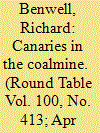

|
|
|
|
|
| Publication |
2011.
|
| Summary/Abstract |
Climate change presents a useful case in the study of small states because their interests can be differentiated from larger states. Small states are expected to respond to international politics, not to lead. The development of the climate regime has seen small states engage in a 'grand strategy' to achieve climate change mitigation. The apparent powerlessness of small states and the nature of the public good problem are central to understanding small states' negotiating power in the climate regime. They have capitalised on their victim status and the common interests of all states to act as regime leaders; but they have not achieved all of their objectives in terms of access to finance and technology. This suggests that while small states share the difficulties of other developing states in pursuing value-claiming goals, they may have a comparative advantage as norm-entrepreneurs.
|
|
|
|
|
|
|
|
|
|
|
|
|
|
|
|
| 5 |
ID:
183446


|
|
|
|
|
| Summary/Abstract |
The author considers the development of Taiwan's position on historical claims to the waters, islands, skerries, and resources of the South China Sea under international law. The article compares the approaches of Taiwan's two leading political parties (Nationalist and Democratic Progressive) to substantiating the country's claims on the natural resources and adjacent waters. The reasons for the emergence and disappearance of the concept in Taiwanese law of "historic waters" to which the jurisdiction of the Republic of China (Nationalist China) should presumably extend are discussed in detail. Special attention is given to Taiwan's measures for the "effective occupation" of two islands (Taiping and Pratas) in the South China Sea. Changes in Taiwan's official position under different administrations are analyzed. While agreeing on everything where Taiping Island is concerned, the Nationalist and Democratic Progressive parties differ over all other pieces of land in the South China Sea. De facto correspondence of the foreign policy positions of Mainland China and the Nationalists, stemming from ideas of a common Chinese identity, is revealed in examining approaches to interpreting the notorious "U-shaped line." The Progressive Democrat-ic Party's attitude toward the South China Sea is due to the Taiwanese identity of its supporters. An obvious contradiction is noted: On the one hand, the Progressive Democrats proclaim the sovereignty of Taiwan (the Republic of China) over all islands in the South China Sea while supporting the unity of the "two shores of the Strait" on the issue of China's territorial integrity. On the other, it pragmatically recognizes the impossibility of actually exercising its nominal sovereignty over the disputed territories, and its doubtfulness from the viewpoint of international law. Nuances in Taiwan's attitude toward the Hague Tribunal's verdict on the Philippines' suit against China, reflected in a number of government statements, are examined in detail. Reasons for the Tribunal's refusal to recognize Taiping Island, the largest in the Pratas group, are identified.
|
|
|
|
|
|
|
|
|
|
|
|
|
|
|
|
| 6 |
ID:
152522
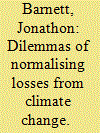

|
|
|
|
|
| Summary/Abstract |
The idea that climate change may cause the loss of atoll countries is now taken for granted in much of climate change science, policy and media coverage. This normalisation of loss means atoll countries now face a future that is apparently finite, which is a grievous situation no other country has to contend with. This paper explains the dilemmas this presents to atoll countries. If there is a risk of forced migration, then strategic planning can minimise its social impacts. Yet, doing so may bring future dangers into the present by undermining efforts to facilitate adaptation to climate change, creating new identities and deterring investments in sustainable resource management. To overcome this dilemma, the paper argues for a more hopeful approach to the future of atoll countries, because for as long as the science of loss remains uncertain, and the limits to adaptation are unknown, forced migration cannot be taken as a matter of fact and could possibly be averted through emission reductions and a vastly improved and significantly more creative approach to adaptation.
|
|
|
|
|
|
|
|
|
|
|
|
|
|
|
|
| 7 |
ID:
124279
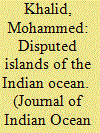

|
|
|
|
|
| Publication |
2013.
|
| Summary/Abstract |
Earth is home to thousands of islands and it is very difficult to know their actual number in the world. More than 600 million people live on islands and one in every ten people on earth is an islander. These islands have isolated individual ecosystems and provide ideal venues for scientific studies of the earth environment. They have typically small populations and their small economies make vulnerable to outside pressure.
|
|
|
|
|
|
|
|
|
|
|
|
|
|
|
|
| 8 |
ID:
152498


|
|
|
|
|
| Summary/Abstract |
Comparative analyses have found that non-self-governing islands tend to have much better development indicators than sovereign islands. Perhaps unsurprisingly, since 1983 no non-self-governing island has acquired political independence. This paper argues that rather than merely maintaining the status quo with their colonial metropoles, non-self-governing islands are actively creating a new form of sovereignty. This creation of an “Islandian” sovereignty takes place against the backdrop of debates on the relevance of classic Westphalian sovereignty and emerging practices of Indigenous sovereignty. This paper reviews global research on the sovereignty of islands and from this review, develops an analytical framework of five mechanisms that drive the emerging Islandian sovereignty. This framework is tested and illustrated with a case study of the negotiations about sovereignty between New Caledonia and its colonial metropole, France.
|
|
|
|
|
|
|
|
|
|
|
|
|
|
|
|
| 9 |
ID:
130875


|
|
|
|
|
| Publication |
2014.
|
| Summary/Abstract |
The fisheries statistics systems of many countries are performing poorly, often failing to report on small-scale catches, particularly from subsistence and recreational fisheries. These deficiencies, which lead to the underestimation of catches, are particularly evident in overseas territories of developed countries. This study is an attempt to remedy this for the years 1950-2010 for the Australia Indian Ocean Territories, an area from which little reporting is done. The results suggest that the Cocos (Keeling) Islands had a catch of approximately 80 t·year?1 in the 1950s (essentially subsistence based), which increased, starting in the mid-1980s to reach 250 t·year?1 in recent years, mainly due to the introduction of recreational and later commercial fishing, with signs of overexploitation since 2000. The coastal catch from Christmas Island was tentatively assessed as being higher (40-70 t·year?1) in the 1950s and 1960s than in the 2000s (<30 t·year?1). Fisheries managers in these areas should focus on determining primary target species and their vulnerability to overfishing, as well as developing island specific recreational fishing management plans.
|
|
|
|
|
|
|
|
|
|
|
|
|
|
|
|
| 10 |
ID:
175241
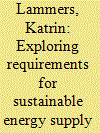

|
|
|
|
|
| Summary/Abstract |
Southeast Asia is one of the regions most affected by impacts of climate change underlying the urgency to build resilience especially for remote and isolated island communities. Moreover, these islands face the problem of expensive and unreliable electricity supply. The large number of island communities further magnifies the difficulty of reaching universal sustainable electricity supply. Off-grid electrification technologies promise to tackle this challenge entailing high investments yet also market potential. Currently both aspects – electricity access and climate resilience - are barely linked in electrification planning. Energy planning in a region highly affected by climate change requires integrative planning considering these risks. Here, to enhance integrative planning, we study the status quo of energy access and risk exposure of non-electrified Southeast Asian islands. We identify 1932 islands with a population greater than 21 million having limited access to electricity. Our study reveals three risk-specific island archetypes, which need different technical measures to enhance climate resiliency of future electricity systems. We conclude that future energy planning in Southeast Asia requires climate resilience as an additional planning dimension. The identified cluster groups serve as a blueprint for decision makers to support measures improving energy systems’ resilience avoiding expensive re-investments in the future.
|
|
|
|
|
|
|
|
|
|
|
|
|
|
|
|
| 11 |
ID:
074522
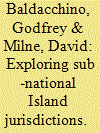

|
|
|
| 12 |
ID:
114194


|
|
|
|
|
| Publication |
2012.
|
| Summary/Abstract |
This paper discusses the contemporary sovereignty experience of small states and territories in the context of unfolding 'strategy games'. This paper charts and illustrates some of the most salient issues over which this dynamic is played out, using binary (small state versus big state) relations as its analytic constituency. These practices are understood as part of the evolution of the conduct of government, or governmentality, as envisaged by Michel Foucault: states, no longer concerned with threats to their very existence, can flex their clout extra-territorially, and in so doing provide new and creative opportunities, but also raise threats, for the exercise of sovereignty.
|
|
|
|
|
|
|
|
|
|
|
|
|
|
|
|
| 13 |
ID:
160248
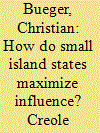

|
|
|
|
|
| Summary/Abstract |
A lack of capabilities is most often taken to imply a lack of influence. The foreign policy of the Seychelles provides a surprising case of successful small state diplomacy that counters this claim. With a population of less than 100,000 and a diplomatic service of 100 staff, Seychelles is recognized as a broker in international organizations and as an agenda setter in ocean governance. This article explores this success in four steps. First, we unpack why the current diplomatic success of Seychelles is a surprise. Second, drawing on literature on small state diplomacy, we identify three sources of small state influence: capability and location, political culture and institutional design, and political strategy. Third, we analyze recent Seychellois diplomacy in light of the four factors as well as the limitations of Creole small state diplomacy. We conclude by discussing what other small states may learn from the Seychelles.
|
|
|
|
|
|
|
|
|
|
|
|
|
|
|
|
| 14 |
ID:
140410
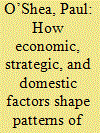

|
|
|
|
|
| Summary/Abstract |
Despite frequent talk of conflict and even war, economic and strategic factors suggest that the Sino–Japanese dispute over the East China Sea will not erupt into hot conflict, at least for the time being. However, for domestic reasons, overt cooperation remains a distant prospect.
|
|
|
|
|
|
|
|
|
|
|
|
|
|
|
|
| 15 |
ID:
189908


|
|
|
|
|
| Summary/Abstract |
This article centers Indigenous epistemologies to critique the United States oceanic security state, a modality of militarization and blue-washing conservation that extends beyond land borders to encompass federal conceptualizations of national security throughout the Pacific Ocean. Beginning with Indigenous perspectives from Oceania, it provides examples of Indigenous peoples’ continuing connections to ocean spaces and challenges to United States colonial geographic imaginaries and militarized destruction. Then, advancing the concept of the oceanic security state, it examines how United States assertions of sovereignty over Oceania are used to justify hyper-militarization while simultaneously destroying the environment and contributing to the climate crisis. These phenomena occur while the USA remains exempt from federal environmental conservation laws through ‘blue-washing’, and the United States government benefits from the exclusion of military emission data within international climate targets. The findings reveal how militarizing all ocean space in the name of United States national security operates within delineated borders of Exclusive Economic Zones, Marine National Monuments, and Marine Protected Areas. Guided by Indigenous epistemologies, the article concludes with alternative ways of understanding ocean spaces and constructing futures of genuine security.
|
|
|
|
|
|
|
|
|
|
|
|
|
|
|
|
| 16 |
ID:
095590


|
|
|
|
|
| Publication |
2010.
|
| Summary/Abstract |
This paper explores the relationship between beers and island development, using a global sweep but with a special reference to the insular Pacific. It adopts a discriminatory approach, touching upon the role and impact that niche and bouquet beer manufacturing can have on the socioeconomic development of small islands. It departs from a personal observation: many small island jurisdictions have their own brewery. Indeed, the brewery could also be the island territory's largest indigenous manufacturing concern. While small islands are associated with low manufacturing capacity and diseconomies of scale, nevertheless 'a local brewery' comes across, in many cases, as a profitable and glaring exception that speaks to the attractions and virtues of locality branding.
|
|
|
|
|
|
|
|
|
|
|
|
|
|
|
|
| 17 |
ID:
124287
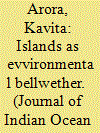

|
|
|
|
|
| Publication |
2013.
|
| Summary/Abstract |
In 1860 Henry Hennessy wrote that "if no great continents existed, but a great number of islands without any remarkble preponderance of land towards the tropical or polar regions, the mean temparature of the earth would be increased, and the distribution of heat over its surface rendered for more uniform."
|
|
|
|
|
|
|
|
|
|
|
|
|
|
|
|
| 18 |
ID:
156868


|
|
|
| 19 |
ID:
092822


|
|
|
|
|
| Publication |
2009.
|
| Summary/Abstract |
The increasing energy challenges faced, in particular, by isolated communities, such as insular communities, call for an integrated, flexible and easy-to-apply methodology aiming at providing a list of renewable energy sources) (RES) projects capable to reduce green house gas (GHG) emissions, satisfy future energy forecasts and reach the objectives of international/national energy directives and obligations, as, for example, the ones set by the Kyoto Protocol by 2010. The EU project EMERGENCE 2010 developed such a methodology that is implemented here in the case study of wind parks in the Dodecanese islands in Greece. The results obtained consist of a final list of financially viable RES wind projects, for which various barriers have been previously identified and assessed. The additional advantages of the proposed methodology is that besides providing as an end result a comprehensive list of RES projects adopted to specific criteria and regional priorities, it also allows space for involving - from early stages - the local community and stakeholders in the decision-making process (participatory planning); in this way, the EMERGENCE 2010 methodology may assist towards the RES promotion and public acceptance, the profitability of RES investments and the regional sustainable development.
|
|
|
|
|
|
|
|
|
|
|
|
|
|
|
|
| 20 |
ID:
130196


|
|
|
|
|
| Publication |
2014.
|
| Summary/Abstract |
The year 2013 in Taiwan was marked by a lackluster economy and stalemated politics. President Ma Ying-jeou's approval rating hit an all-time low. Still, Taiwan's relations with China were smooth, and Taiwan was able to make some gains in the international arena.
|
|
|
|
|
|
|
|
|
|
|
|
|
|
|
|
|
|
|
|
|